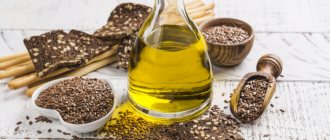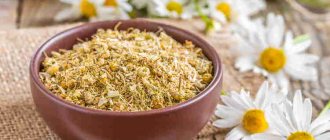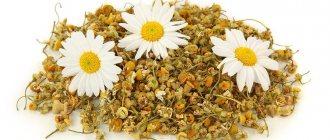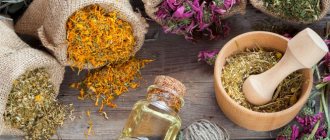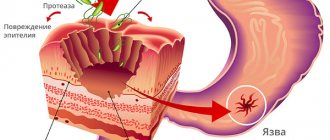Since ancient times, many people have used chamomile to treat the intestines, because its inflorescences are rich in biological substances that have a beneficial effect on the entire human body and have an anti-inflammatory effect due to the fact that they reduce mediators of the inflammatory process. In addition, chamomile does not carry the side effects inherent in non-steroidal anti-inflammatory drugs: the flowers do not increase blood pressure, do not have a nephrotoxic effect and do not lead to any injuries to the gastric mucosa.
Chamomile is an excellent anti-inflammatory and antiseptic plant that can be used in intestinal therapy.
Chemical composition
The inflorescences of this plant are extremely widespread in medicine. Such a healing plant is rich in considerable chemical composition:
- fats;
- phytosterols;
- essential oil;
- glycoside;
- sugar;
- gum;
- dioxycoumarin;
- slime;
- choline;
- glycerides;
- pectins.
A decoction prepared from inflorescences contains an essential oil containing in its structure more than 40 different useful components. In addition, chamomile also contains luteolin, apigenin derivatives and quercetin, which is why chamomile is so famous for its high anti-inflammatory effect.
Benefits of chamomile for the stomach
The plant has a rich chemical composition, which allows it to be used to combat various diseases. In particular, the gastrointestinal tract is particularly benefited by tannins and organic acids included in the composition, as well as phytosterols, flavonoids, vitamins and retinols.
Important! The components of the decoctions help fight pain in the stomach and intestines, simultaneously providing anti-inflammatory and antimicrobial effects.
In the initial stages of the disease, you can safely use the substance, even without pharmaceuticals. Chamomile has the following effects:
- envelops the walls of the stomach and intestines, gently restoring microflora and mucous membranes;
- eliminates pain;
- soothes and heals damaged tissues;
- has a pronounced choleretic effect;
- stimulates blood circulation;
- reduces the level of flatulence and gas formation.
In general, chamomile has a gentle effect, stopping pathological processes and the development of pathogenic microorganisms in the gastrointestinal tract. Digestive functions are quickly restored.
Healing qualities of chamomile decoction
Infusions and decoctions include a huge number of healing properties, thanks to which the inflorescences are a valuable aid against many diseases. The healing qualities include the following:
- mild sedative effect, which is suitable for both adults and children;
- protection from neuroses and stress;
- stimulation of bile secretion, due to which these infusions are drunk during intestinal diseases;
- reduction of pain during spasms;
- improving cerebral circulation;
- reduction of toothache.
Preparing tea for the stomach and how to take it
It is recommended to drink a drink made from chamomile for various ailments of the gastrointestinal tract. Treatment usually consists of taking 200 ml of tea before meals three times a day. The most common recipes:
- A classic drink. Take 10 grams of dried chamomile flowers and add boiling water. This mixture should sit covered for about 25 minutes, then it should be filtered. It is recommended to drink the resulting liquid in its pure form or combine it with other types of tea.
- Tea with lemon balm and chamomile. Dry raw materials should be steamed with boiling water and left to cool. To improve the taste of the broth you need to add a little honey.
- Drink with peppermint and chamomile flowers. These components are poured into a glass of hot water and covered with a lid. After 10 minutes, the tea is filtered and drunk immediately.
The use of infusions for intestinal diseases
Chamomile infusions can be used for preventive purposes of intestinal diseases.
When a patient has gastrointestinal diseases, he will need to start taking chamomile. During treatment with chamomile, the mechanism of action will consist of the following processes: improved secretion of the digestive glands, increased choleretic effect, reduction of fermentation processes in the body and complete cessation of pain. The scheme of action on the body in this situation will be as follows:
- improvement of intestinal function;
- normalization of gallbladder activity;
- reduction of the inflammatory process;
- cleaning the mucous membrane.
For colitis
Colitis is one of the most common pathologies of the intestinal tract. It is caused by the formation of inflammation in the intestines, which is caused by a number of different factors. Colitis is often a consequence of poor nutrition, poor digestion and metabolism, which are caused by diseases of the pancreas or pathologies in the gallbladder.
Medicinal chamomile products are very popular in the treatment of colitis, because they have an anti-inflammatory effect, help reduce the progression of the inflammatory process in the intestinal tract and interrupt the clinical manifestations of the disease, which are often expressed as sharp abdominal pain.
For spasms
Chamomile infusion eliminates pain symptoms caused by inflammation in the intestines.
Sometimes patients drink remedies from chamomile inflorescences to relieve stomach cramps, however, most often they do not achieve the desired result. There is some truth to this, because to stop spasms, and not pain, you should take other medications that are aimed at directly eliminating spasms. Chamomile does not have an antispasmodic property as such, therefore it is able to remove a spasm only when it was provoked by an inflammatory process. In other situations, when spasms are of a different nature, for example, psychogenic, the medicinal properties of chamomile inflorescences do not have a corresponding effect on the patient.
Moreover, it is necessary to remember that the frequent occurrence of spasms in the intestines requires detailed diagnosis and the help of a doctor in order to make a correct diagnosis and find out the sources of pain. Drinking chamomile infusion in such a situation would not be the best idea, because its decoction can smooth out clinical symptoms and complicate the diagnosis process. Based on this, it must be said that it is better not to independently use even this harmless folk remedy for treatment, and if stomach cramps occur, you must visit a doctor and conduct a full examination.
For other intestinal diseases
Chamomile shows excellent results in the treatment of colitis of various etiologies, however, it must be taken into account that it will not show the desired effect in every disease. Moreover, long-term or constant use is impossible, because infusions have a complex effect on the entire body and can cause side effects. Based on this, you should drink chamomile for stomach diseases only in situations where there are indications for it and only during the course of treatment, which takes about 2-3 weeks.
Composition and beneficial properties of chamomile
Since ancient times, it has been used to eliminate a wide variety of diseases. All this is due to the presence of a large number of useful substances in it. Among them, the most miraculous are considered:
- vitamins;
- macro and microelements;
- flavonoids;
- minerals and others.
But there are still many important effects on the body. For stomach problems and disorders, she is able to:
- relieve the inflammatory process;
- eliminate colic;
- reduce pain;
- increase immunity;
- heal wounds and erosions;
- destroys pathogenic microorganisms;
- helps cope with stress that can provoke an exacerbation of an existing situation;
- stops bleeding;
- produces a carminative effect, which relieves bloating;
- stop spasms.
But don’t think that this will solve all your stomach problems. Quite often, products based on it are part of an integrated approach to selected therapy. Indications for use can be varied, which are associated not only with disturbances in the normal functioning of the intestines and liver. Decoctions and infusions from this herb will help cope with pathological disorders. Many doctors are of the opinion that during treatment, a patient with gastrointestinal disorders should stop taking tea and coffee and replace them with chamomile tea.
INTERESTING fact: How to treat rectal cancer with folk remedies
Taking drugs based on it also has a positive effect on other organs and systems.
How to drink chamomile decoction and infusion for the intestines?
To prepare a decoction of inflorescences, you need to take a container, add 2 tablespoons of chamomile and pour 200 ml of boiling water, then cover with a lid, place in a water bath and leave for 25-30 minutes. After this, set the broth aside and let it cool for about 15 minutes at room temperature, then use gauze or a sieve to strain and add boiled water so that the liquid volume is 200 ml. The decoction should be consumed in small doses throughout the day.
Chamomile infusion is prepared as follows:
- 1 teaspoon of inflorescences is poured with 200 ml of boiling water;
- infuses for 20 minutes;
- taken orally in a glass at night as a sleeping pill, 1 hour before bedtime.
Recipes
The most popular chamomile-based remedies are tea and decoction. Let's tell you more about how to prepare them:
Chamomile tea
The drink should not be boiled - just pour boiling water over the chamomile flowers and leave for half an hour or keep in a water bath for 15 minutes to get a richer taste.
For 2 servings you will need:
- Two teaspoons of chamomile flowers;
- One glass of boiling water;
- 1 teaspoon honey;
- 3 fresh mint leaves (0.5 tablespoon dried).
Pour water evenly over the dry mixture, add honey, a few mint leaves, and sugar to taste. Let the tea brew and drink warm.
https://youtu.be/U5kh3u953jM
Chamomile decoction
For 1 serving you will need:
- Four tablespoons of chamomile flowers;
- Two glasses of boiling water;
Mix chamomile flowers with boiling water, cook in a water bath for about 30 minutes, then strain. Use for treatment at the rate of 2-4 tablespoons in half a glass of water 2-3 times a day before meals for two weeks.
Since ancient times, many people have used chamomile to treat the intestines, because its inflorescences are rich in biological substances that have a beneficial effect on the entire human body and have an anti-inflammatory effect due to the fact that they reduce mediators of the inflammatory process. In addition, chamomile does not carry the side effects inherent in non-steroidal anti-inflammatory drugs: the flowers do not increase blood pressure, do not have a nephrotoxic effect and do not lead to any injuries to the gastric mucosa.
Contraindications and side effects
Chamomile, like other medicines, has contraindications, and if it is used incorrectly, it can cause harm to the patient. For example, it is not recommended to use infusions together with aspirin, alcohol, sedatives and blood thinning medications. Also, chamomile should not be consumed during pregnancy or with anacid gastritis. No side effects have been identified if you take chamomile in recommended doses, however, an overdose is possible, which will lead to headaches, mild hoarseness, cough, painful menstruation and mental disorders.
Application
Alternative medicine contains different recipes for chamomile for diarrhea. The main advantage of the funds is their availability. To treat diarrhea, you can buy chamomile tea at any pharmacy or collect chamomile yourself. In order for the treatment to be beneficial, you need to take into account the proportions, indications for use, choose the right recipes, and other criteria for use.
It is difficult to get rid of diarrhea by drinking exclusively herbal tea; general recommendations must be taken into account: avoid fatty, fried, spicy foods, and limit the consumption of carbonated mineral water. They eat rice porridge cooked in water, applesauce, bananas, protein foods, and low-fat fermented milk products.
Use for adults
Chamomile tea helps with diarrhea when the cause of the disorder is not caused by serious infectious diseases. In case of infection, you should consult a doctor.
Recipes that have proven their effectiveness:
- For the decoction, pour 2 tablespoons of dried flowers into a liter of boiling water and leave for at least an hour. After preparation, you should take 200 ml 1 hour before meals, 4 times a day.
- A spoonful of dried flowers is filled with 1/2 liter of clean water. Boil for 10 minutes. Then the product is filtered, cooled and drunk 3 times a day before meals, 250 ml.
- Chamomile decoction with mint. Mix dried flowers in equal parts (1 teaspoon each), pour in 1/2 liter of boiling water, leave for an hour, filter, drink slowly, in small sips.
- Chamomile with yarrow. Raw flowers are mixed in equal proportions (1/2 cup each), poured with boiling water, and allowed to stand for at least an hour. Strain and add 4 tablespoons to tea.
- 1 tablespoon of dried flowers is poured into 1/2 liter of boiling water, heated in a water bath for 10-15 minutes. The decoction is filtered and taken half a glass four times a day.
- Hot infusion. 1 tablespoon of raw flowers is poured into a thermos and poured with a glass of boiling water. Let it brew for 3 hours. A glass of concentrate is diluted with water to 500 ml, taken after meals three to four times a day until diarrhea stops. Store the resulting infusion in a cool place for no more than 2 days.
- Pour 2 tablespoons of dried flowers into a glass of drinking water and leave in a dark place at room temperature. The decoction is stored in the same way as hot decoctions.
- It is allowed to use pharmacy chamomile tea. 1 sachet is filled with 300 ml of water and drunk 3 times a day before meals.
Take chamomile tea until symptoms disappear. To consolidate the effect, it is recommended to continue treatment for a couple more days.
Loose stools dehydrate and require replenishment of water and electrolyte balance. An adult should drink 2-3 liters of rice water or saline solution (for 1 liter of boiled water, 1 tablespoon of salt and 1 tablespoon of sugar).
Use for prophylactic purposes
The medicinal properties of chamomile collection are multifaceted. If diarrhea occurs frequently and there are no serious illnesses, it is permissible to drink infusions for preventive purposes. Prevention has a beneficial effect on the body’s condition, helps strengthen it, improves immunity, and improves mood.
Diarrhea is caused by disorders of the nervous system. Chamomile tea has a sedative effect, calms the nerves, and makes it easier to fall asleep.
For prevention, low dosages are taken; for adults, 1 glass of decoction is spread over the day; children are offered a quarter glass per day.
Chamomile for gastritis
When gastritis occurs, various symptoms appear: belching, nausea, loss of appetite, vomiting and others. There are many methods of treating the disease, and often classical methods of treatment are successfully combined with traditional medicine. The most successful is the use of chamomile products.
The pharmaceutical type of chamomile is used for medicinal purposes. This is a time-tested, reliable remedy that has beneficial properties for the body.
This herb contains unique elements and substances that provide the prevention and treatment of stomach diseases.
The medicinal plant contains:
- essential oils;
- carotene;
- various acids (stearic, salicylic, oleic);
- tannins;
- flavonoids;
- polysaccharides;
- vitamins.
Chamomile for gastritis is often prescribed, as an auxiliary remedy that can significantly improve the general condition of the patient.
Symptoms
The development of such a pathology can be triggered by nervous stress, bad habits, poor diet and other factors.
People may suspect something is wrong based on the following signs:
- systematic belching appears, which has a sour taste;
- pain occurs in the abdominal area;
- heartburn and nausea appear;
- defecation processes are disrupted;
- discomfort appears, etc.
Enemas with chamomile infusion
To make a chamomile decoction for an enema, you need:
- pharmaceutical chamomile;
- water.
Preparation
- Pour hot water over chamomile in a thermos.
- Leave for 6 hours.
- Squeeze out using gauze.
- Use a non-concentrated decoction after eating food.
When the product takes effect, it is recommended to repeat the procedure. The course of treatment is carried out over 2 weeks.
An enema with chamomile decoction will help relieve pain during bowel movements.
Effective herbal treatments for stomach ulcers
Recipes with herbs
The use of herbs for duodenal and gastric ulcers prolongs the remission of the disease and helps the patient even at the first symptoms. It is very important not to wait for exacerbations of the disease, but to carry out a course of herbal medicine regularly.
Herbal infusions normalize stomach acidity and help cure epithelial defects. If there is no bleeding and the pain is moderate, constant use of medicinal decoctions can completely cure the disease. However, you can only consume freshly brewed decoctions. The main goal of herbal treatment is an enveloping and astringent effect, due to which the acidic environment has less effect on the mucous membrane.
Properly formulated herbal infusions provide therapeutic effects:
- antimicrobial, against Helicobacter;
- antispasmodic and anti-inflammatory;
- local protection of the mucous epithelium;
- deactivation of toxic substances;
- strengthening the immune system, restoring the balance of minerals and vitamins.
In medicine, folk herbal remedies are used both in the treatment of duodenal or gastric ulcers in a complex manner, and separately from pharmacological drugs, for the purpose of prevention and remission of the disease.
There are many methods and recipes, as well as medicinal herbs. In folk medicine, to cure ulcers, you can use: marshmallow, coltsfoot, sophora, chicory, comfrey, nettle, aloe, plantain, yarrow, St. John's wort, oleoresin, vegetable oils and other remedies.
Fresh juice and decoction from the leaves of the plant are recommended for duodenal and stomach ulcers. Pour boiling water (1 cup) over a tablespoon of ground leaves and wait 10 minutes. You can drink the infusion an hour before meals every day.
To cure ulcers, the seeds are also used - a tablespoon is infused in 0.5 cups of boiling water for half an hour. Reception - 1 tbsp. l. before meals, 3 times a day.
A teaspoon of herbs is brewed in 250 g of boiling water and placed on low heat for 10 minutes, then filtered. The decoction should be drunk half a glass three times a day, and the course of treatment should be a month.
A small pea of resin should be dissolved in a glass of heated milk, and the product should be drunk half an hour before meals.
According to the folk recipe, 50 g of fruit and half a liter of regular vodka are required for duodenal ulcers. The product should be infused for a whole month. Then take a teaspoon twice a day and drink the infusion shortly before meals. You can drink the remedy with a decoction of yarrow or St. John's wort.
According to a proven method, two tablespoons of leaves should be boiled in one and a half liters of water, left for half an hour and filtered. You can drink a third of a glass before meals.
According to the recipe, take the leaves of old plants, excluding watering two weeks before cutting. The taken leaves are kept in the refrigerator for a week, crushed, and the resulting pulp is eaten twice a day, one tablespoon, on an empty stomach. If you take aloe juice, it is advised to dilute it in equal parts with honey and consume 50 ml.
20 g of seeds are poured into 400 ml of boiling water, covered and left overnight. The infusion is filtered and 100 ml is drunk shortly before the meal. The course of treatment is a couple of weeks.
It is important to use all herbs and their derivative recipes after consultation with your doctor to avoid unwanted consequences.
Flowers collected in summer have the greatest healing properties. The course of treatment is up to 4 months. Decoction recipe: 10 g of flowers are poured into 250 ml of boiling water in a thermos, left for 3 hours, filtered. You should drink 50 ml of the product every 8 hours before meals.
20 g of inflorescences are poured into 250 ml of boiled water and left for half an hour. Then the broth is filtered through cheesecloth. You should drink 50 ml on an empty stomach.
For duodenal and stomach ulcers, this plant can neutralize hydrochloric acid. Use a decoction or juice of celandine. Recipe: 20 g of chopped stems per glass of boiling water. The mixture simmers for 20 minutes in a water bath, then filters and cools. Drink 100 g of the product before meals. Fresh celandine juice should be diluted with water or milk: only 5 drops of juice are needed for half a glass. They drink the drug three times a day immediately before meals, and the course of administration is ten days.
2 tbsp. l. The ground dry root is placed in half a liter of water, boiled over low heat for 10 minutes, then filtered. You can take half a glass every day.
An effective collection recipe to cure an ulcer: half a tablespoon of licorice, marshmallow, chamomile and fennel is mixed, and the mixture is boiled in half a liter of water for several minutes, filtered, and 3 tbsp is dissolved in it. l. flower honey. The product is consumed warm, half a glass, three times a day a couple of hours before meals.
Video “How to cure an ulcer with herbs?”
Contraindications
If you have a stomach ulcer, as well as a duodenal ulcer, you should be aware of contraindications to the use of herbs:
- in the acute phase of a peptic ulcer, calamus infusion should not be used;
- it is prohibited to use oregano, cocklebur and volodoshka;
- juniper is not recommended for use on ulcers;
- male fern should not be used;
- In order to completely cure an ulcer, you must refrain from eating onions, sweet peppers, horseradish, and garlic in case of high acidity.
Herbal medicine is also contraindicated if the patient has an allergic reaction to the herb or component of the collection. Herbal treatment alone should not be used if the disease is in an acute state (threat of bleeding, multiple ulcers, severe pain and dyspepsia). In severe cases of the disease, it can only be cured comprehensively, using strict diets and taking pharmaceutical medications.
Properties
This medicinal plant has been actively used in folk medicine for thousands of years. Its unique composition is able to compete with most modern drugs presented on the pharmacological market.
The plant can have the following effects on the human body:
- relieves pain;
- in case of stress, calms the central nervous system;
- acts as a choleretic agent;
- relieves swelling as quickly as possible;
- accelerates regeneration processes in tissues, due to which external and internal wounds heal faster;
- promotes restoration of mucous membranes;
- improves blood circulation;
- relieves spasms and colic;
- eliminates toothache;
- normalizes sleep;
- eliminates gas formation, nausea and vomiting;
- relieves inflammation;
- eliminates fermentation processes;
- normalizes peristalsis;
- activates secretory functions, etc.

